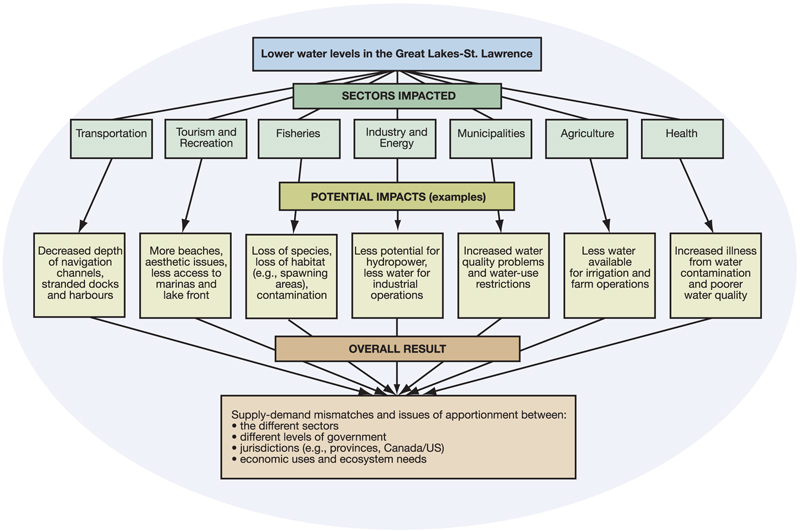PREVIOUS WORK
(A Canadian
Perspective)
"The sensitivity of a
water resource system to climate change is a function of several physical
features and, importantly, societal characteristics.”
Numerous reports and workshops involving researchers and
stakeholders have identified water resources as one of the highest priority
issues with respect to climate change impacts and adaptation in Canada. This
reflects both the climatic sensitivity of the resource and the crosscutting
nature of water issues, where adaptation decisions in one sector will have
significant consequences in several other sectors. Figure 1 illustrates some of
these issues as they relate to decreasing water levels in the Great Lakes–St.
Lawrence basin, and the impacts on sectors such as transportation, fisheries,
agriculture and human health.
FIGURE 1: Water resources is a crosscutting issue

In their summary of research as part of the Canada Country
Study, Hofmann et al., stated that climate change will have a range of impacts
on both the hydrological cycle and water uses. For the nation as a whole,
climate change will likely increase precipitation, evaporation, water
temperatures and hydrological variability. These changes will combine to
negatively impact water quality. Regional projections include declining Great
Lakes water levels, decreasing soil moisture in southern Canada, and a
reduction of wetlands in the Prairies. Another key concern is increased
conflict between water users due to increasing mismatches between supply and
demand.
Previous literature suggests infrastructure modification, management
adjustment and development of new water policies as methods of adaptation in
the water resources sector. Uncertainties in impact projections have led many
authors to advocate the implementation of ‘no regrets’ adaptation options.
These measures would benefit Canadians, irrespective of climate change, as they
address other environmental issues. The engagement of stakeholders, including
the general public, is critical to the development of effective adaptation strategies.
Perhaps most importantly, the literature notes that water managers must be encouraged to address
climate change impacts in their long-term planning activities.
Much of the research on water resources and climate change has concentrated on the physical aspects of the issue, particularly hydrological impacts, and less so on the economic and social aspects. This imbalance and the resulting knowledge gaps have been recognized in the literature, and in the reports and proceedings of numerous workshops and similar forums that have addressed climate change impacts and adaptation in Canada.


